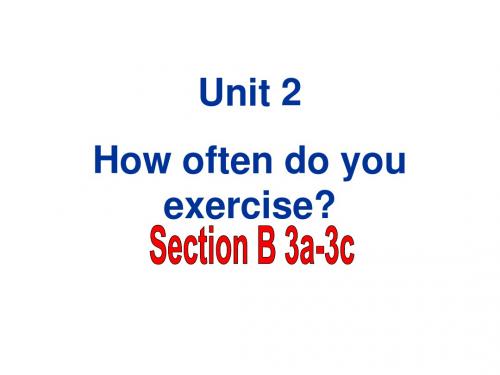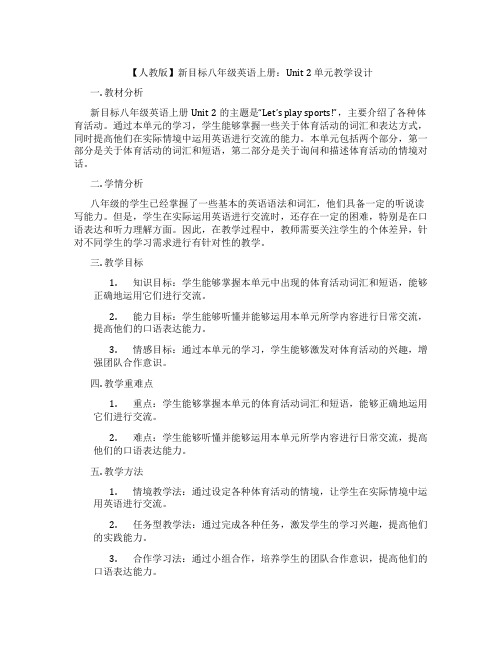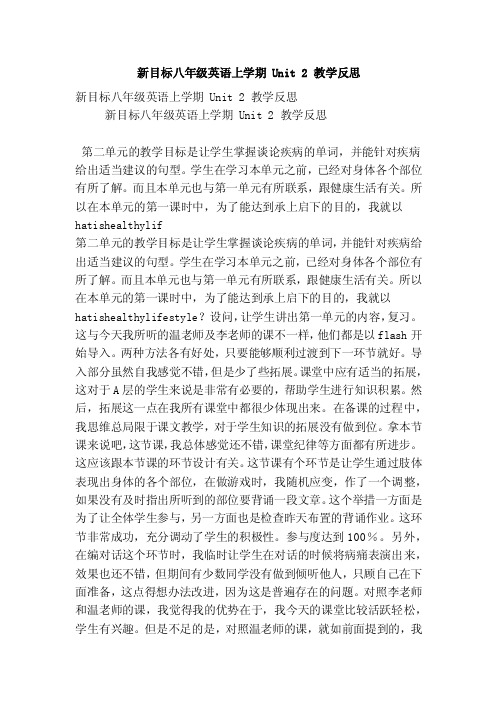2013版新目标八年级英语上Unit2
2013年八年级英语上册_Unit_2_How_often_do_you_exercise_Section_B_3a-3c写作课件_(新版)人教新目标版

4. He is talking to his father.
(用usually改写句子) usually _____ talks to his father. He _______ 5. My father often reads newspaper
after supper.(画线提问) What _____ does _____ your father often ____ do _____ after supper?
Healthy/unhealthy lifestyle?
Lisa sleeps eight hours every night. She eats a good breakfast and she exercises every day. She never eats junk food.
读一读, 判断谁的生活 健康?
Healthy/unhealthy lifestyle?
Pam likes to watch TV. On weekends, she never exercises and she doesn’t like fruit or vegetables. She eats junk food. And Pam never goes to the doctor.
C. for; healthy
D. for; health
3. — _______ A do you go skating? — Every day.
A. How often
every day.
B. How many C. When
B exercise 4. Most students in my class ____
Write a report about your good and bad habits. Say how often you do things. Use the report in 3a as an example.
人教新目标八年级英语上册思维导图课堂笔记Unit2Howoftendoyouexercise

⼈教新⽬标⼋年级英语上册思维导图课堂笔记Unit2HowoftendoyouexerciseUnit 2 How often do you exercise?2013版⼈教新⽬标⼋年级英语上册思维导图课堂笔记1. housework n. 家务劳动;家务事We should help our mothers do the housework. 我们应该帮助妈妈做家务。
不可数名词do the housework做家务homework家庭作业homework家庭作业workhouse劳动救济所schoolwork课堂作业workplace⼯作场所workhorse吃苦耐劳的⼈workbook练习册2. hardly adv. ⼏乎不;⼏乎没有There’s hardly any tea left. 没有剩下什么茶。
表否定,改反意疑问句时,疑问部分⽤肯定形式This boy hardly eats junk food,does he?=almost nothardadv.努⼒地;艰难地adj.困难的3. ever adv. 在任何时候;从来;曾经Don’t you ever get tired? 难道你从来不累吗?hardly ever⼏乎从不ever since⾃从常⽤于疑问句和否定句中neveradv.从不,从来没有4. once adv. ⼀次,曾经The farmers here sow once a year. 这⾥的农民⼀年播种⼀次。
once a week⼀周⼀次意为“曾经”时,常与过去时连⽤。
位于⾏为动词之前、系动词之后。
He once lived in Hangzhou.This book was famous once,but now nobody reads it.5. twice adv. 两次,两倍I go shopping twice a week. 我⼀个星期购物两次。
Cats sleep twice as much as people. 猫睡觉的时间是⼈的两倍。
【人教版】新目标八年级英语上册:Unit 2 单元教学设计

【人教版】新目标八年级英语上册:Unit 2 单元教学设计一. 教材分析新目标八年级英语上册Unit 2的主题是“Let’s play sports!”,主要介绍了各种体育活动。
通过本单元的学习,学生能够掌握一些关于体育活动的词汇和表达方式,同时提高他们在实际情境中运用英语进行交流的能力。
本单元包括两个部分,第一部分是关于体育活动的词汇和短语,第二部分是关于询问和描述体育活动的情境对话。
二. 学情分析八年级的学生已经掌握了一些基本的英语语法和词汇,他们具备一定的听说读写能力。
但是,学生在实际运用英语进行交流时,还存在一定的困难,特别是在口语表达和听力理解方面。
因此,在教学过程中,教师需要关注学生的个体差异,针对不同学生的学习需求进行有针对性的教学。
三. 教学目标1.知识目标:学生能够掌握本单元中出现的体育活动词汇和短语,能够正确地运用它们进行交流。
2.能力目标:学生能够听懂并能够运用本单元所学内容进行日常交流,提高他们的口语表达能力。
3.情感目标:通过本单元的学习,学生能够激发对体育活动的兴趣,增强团队合作意识。
四. 教学重难点1.重点:学生能够掌握本单元的体育活动词汇和短语,能够正确地运用它们进行交流。
2.难点:学生能够听懂并能够运用本单元所学内容进行日常交流,提高他们的口语表达能力。
五. 教学方法1.情境教学法:通过设定各种体育活动的情境,让学生在实际情境中运用英语进行交流。
2.任务型教学法:通过完成各种任务,激发学生的学习兴趣,提高他们的实践能力。
3.合作学习法:通过小组合作,培养学生的团队合作意识,提高他们的口语表达能力。
六. 教学准备1.教师准备:教师需要准备本单元的教学课件、教学素材和相关的体育活动器材。
2.学生准备:学生需要预习本单元的内容,熟悉并掌握相关的体育活动词汇和短语。
七. 教学过程1.导入(5分钟)教师通过向学生展示一些体育活动的图片,引导学生谈论他们喜欢的体育活动,激发学生的学习兴趣。
新目标八年级英语上学期unit2教学反思(精选篇)

新目标八年级英语上学期 Unit 2 教学反思新目标八年级英语上学期 Unit 2 教学反思新目标八年级英语上学期 Unit 2 教学反思第二单元的教学目标是让学生掌握谈论疾病的单词,并能针对疾病给出适当建议的句型。
学生在学习本单元之前,已经对身体各个部位有所了解。
而且本单元也与第一单元有所联系,跟健康生活有关。
所以在本单元的第一课时中,为了能达到承上启下的目的,我就以hatishealthylif第二单元的教学目标是让学生掌握谈论疾病的单词,并能针对疾病给出适当建议的句型。
学生在学习本单元之前,已经对身体各个部位有所了解。
而且本单元也与第一单元有所联系,跟健康生活有关。
所以在本单元的第一课时中,为了能达到承上启下的目的,我就以hatishealthylifestyle?设问,让学生讲出第一单元的内容,复习。
这与今天我所听的温老师及李老师的课不一样,他们都是以flash开始导入。
两种方法各有好处,只要能够顺利过渡到下一环节就好。
导入部分虽然自我感觉不错,但是少了些拓展。
课堂中应有适当的拓展,这对于A层的学生来说是非常有必要的,帮助学生进行知识积累。
然后,拓展这一点在我所有课堂中都很少体现出来。
在备课的过程中,我思维总局限于课文教学,对于学生知识的拓展没有做到位。
拿本节课来说吧,这节课,我总体感觉还不错,课堂纪律等方面都有所进步。
这应该跟本节课的环节设计有关。
这节课有个环节是让学生通过肢体表现出身体的各个部位,在做游戏时,我随机应变,作了一个调整,如果没有及时指出所听到的部位要背诵一段文章。
这个举措一方面是为了让全体学生参与,另一方面也是检查昨天布置的背诵作业。
这环节非常成功,充分调动了学生的积极性。
参与度达到100%。
另外,在编对话这个环节时,我临时让学生在对话的时候将病痛表演出来,效果也还不错,但期间有少数同学没有做到倾听他人,只顾自己在下面准备,这点得想办法改进,因为这是普遍存在的问题。
对照李老师和温老师的课,我觉得我的优势在于,我今天的课堂比较活跃轻松,学生有兴趣。
新目标英语八年级上unit 2 教案

课题Unit 2 What’s the matter? Section A 授课教师付莲萍课型New lesson 授课班级八年一班教材分析:本课学习一些有关身体部位、疾病的词汇和短语,学生通过小组合作与交流能够应用所学知识进行病情的具体询问并提出是适当的建议学情分析:学生对一些有关身体部位的单词有一定的了解,能够在已有的知识上进一步升华,积极配合课堂的各个环节。
教学目标:1)Knowledge Objects:Important words: stomach , nose , tooth , sore , toothache , have a coldSentence Pattern: What’s the matter? What’s wrong with sb?I have a headache/stomachache/toothache/sore back/sore throat.2) Ability Objects: a、To train students’ listening ability.b、To train stude nts’ writing ability.3) Moral Objects:Know how to take care of yourself and others.T教学重点:1) Master the new words:stomach , nose , tooth , sore , toothache2) Know the usage of the sentence pattern such as “What’s the matter?I have a cold3) Give advice according to different illness教学难点:Use the sentence pattern freely and give advice according to different illness教学用具:A computer for multimedia use.教学方法:任务型教学法、小组合作法教学过程教师活动学生活动设计意图教学环节Step one : Lead inHow many parts of the body canyou name? You have done a goodjob, there are some new wordsabout the body, let’s learn themtogether.Step two : PresentationDivide the whole class into fivegroups and have a competitionamong them.1、Show a picture of the body,Point and say the names of thebody parts students don’t knowand write the words on theblackboard .Then teach them toread the words.2、PracticeShow the picture and let studentsname the parts of the body, thenfinish 1a.3、Gane timeTouch and say the parts of the bodyas quickly as possible.4、Show language pointsWhat’s the matter?I have a toothache\cold\sorethroat.Step three: Listening PracticeFirst, students go over the wordsand phrases, try to match theproblems with the advice.Then listen to the tape and checkthe answers,At last, listen to the tape again andfill in the blanks of 2b.Students say the body partsthey learned.Students try to learn andremember the new wordsTry their best to finish theexercise.Touch and say the namesof the body as quickly aspossible.Look at the pictures andmake a small conversation.Go over the words andphrases, then listen to thetape carefully and finishthe exercise.Inspire theinterest ofthe students.Step four: Pair workLook at the sample conversation, then imagine you are a magic doctor, role play your own conversations with your partners. Step five: SummarySum up today’s important points. Step six: Homework1. Read each new words & dialogues of P7 & 8 three times (☆).2. Interview your family members and write 2 dialogues on their health(☆☆). Role play the conversations Sum up today’s important points.板书设计Unit 2 What’s the matter?I fever drink lots of water You cold take some medicine He have\has stomachache should\shouldn’t lie down and rest She toothache see a dentistThey sore throat drink hot tea with honey。
【人教版】新目标八年级英语上册:Unit 2 单元说课稿

【人教版】新目标八年级英语上册:Unit 2 单元说课稿一. 教材分析新目标八年级英语上册Unit 2主要讲述了关于一般现在时的用法。
本单元包括两个部分:Section 1和Section 2。
Section 1主要介绍了一般现在时的基本结构和用法,通过一个关于家庭成员的对话和一个关于日常活动的,让学生理解和掌握一般现在时的构成和表示含义。
Section 2则通过一个故事和一个任务型阅读,进一步巩固一般现在时的用法,并引导学生运用一般现在时进行叙述和描述。
二. 学情分析八年级的学生已经掌握了英语学习的基本语法和词汇,具备一定的听、说、读、写能力。
但对于一般现在时的理解和运用,部分学生可能还存在一定的困难。
因此,在教学过程中,需要关注学生的个体差异,针对性地进行教学,帮助学生理解和掌握一般现在时的用法。
三. 说教学目标1.知识目标:学生能够理解一般现在时的概念、结构和用法,能够正确运用一般现在时进行叙述和描述。
2.能力目标:学生能够在日常交流中运用一般现在时,提高英语表达的能力。
3.情感目标:通过本单元的学习,学生能够培养对英语学习的兴趣,增强自信心。
四. 说教学重难点1.教学重点:一般现在时的结构、用法和意义。
2.教学难点:一般现在时的运用,特别是在具体情境中的运用。
五. 说教学方法与手段1.教学方法:采用任务型教学法、情境教学法和交际法,让学生在实际情境中理解和运用一般现在时。
2.教学手段:利用多媒体课件、图片、故事等教学资源,激发学生的学习兴趣,提高课堂参与度。
六. 说教学过程1.导入:通过一个与学生生活密切相关的场景,如询问学生家庭成员的姓名和年龄,引导学生进入一般现在时的学习。
2.新课呈现:通过一个关于家庭成员的对话和一个关于日常活动的,展示一般现在时的结构和用法。
3.实践环节:学生分组进行角色扮演,运用一般现在时进行对话,巩固所学知识。
4.任务型阅读:学生阅读一个关于故事的文章,回答相关问题,进一步理解一般现在时的用法。
新目标英语八年级上Unit 2同步阅读(含答案)
新目标英语八年级上Unit 2同步阅读(含答案)Unit 2 What’ the matter?1Read the replies given by the doctor. Match the questions and write the name of the writer at the2Look at the words in Column A. They are from the doctor replies. Match them with the meaningsin Column B. (将下面A栏中的词语与B栏中相对应的解释连线。
)A B1.height2.diet3.rich4.regular5. avoid a.happening, coming, or doing something again at the same time each dayb.keep away fromc.the degree of being tall or highd.with a lot of cream, sugar, eggs, etc.e. limited food and drink that a person is allowed3Read the article and then choose the right answers. (读短文,选择正确答案)One day, I had a bad toothache. I couldn’t eat anything. So I went to see the dentist.“What’s wrong with your teeth?” asked the dentist.“I have a toothache,” I told him.“Let me see your teeth…Um, there’s a hole in one of the teeth. Do you eat a lot of sweet food?”the dentist asked me.“Yes, I do. I often eat ice cream, biscuits, chocolates and I often drink colas and milk with sugar,” I told him.“All these are bad for your teeth. You must eat less sweet food and brush your teeth at least twice every day. Now let me fill your teeth,” said the doctor.( ) 1. What was wrong with the writer?A. She couldn’t eat or sleep.B. She had a toothache.C. She couldn’t eat and sweet food.D. She had a headache.( ) 2. The doctor looked over the writer’s teeth and found ____________A. a hole in one of her teethB. two holes in her teethC. some holes in her teethD. a big hole and a small hole in her teeth( ) 3. The writer ___________________.A. doesn’t like eating sweet food or drinking sweet milkB. doesn’t like having any food or drinkC. likes eating sweet food and drinking sweet waterD. likes having sweet food and drink( ) 4. Eating less sweet food _______________.A. isn’t good for our teethB. is only good for children’s teethC. is good for our teethD. is bad for our teeth( ) 5. Which of the following is true?A. The dentist filled all the writer’s bad teeth.B. The dentist didn’t fill the writer’s bad tooth .C. The dentist pulled the writer’s bad tooth out.D. The dentist filled the writer’s bad tooth.Keys1. 1. C Victor2. B Sharon3. A Nick2. 1. c 2.e3.d4.a5.b3.BADCD。
新目标英语八年级上Unit2知识要点精讲
Keys: 1. should see 2. shouldn t’ drive 3. Should; ask 4. should be 5. shouldn t’ make 6. should say 7. shouldn t’ have
做”, shouldn’t have done sth. 表 示“ 做了 本 不 应做 的事 ”。例 如:
1. 劝 告、建议 等。 例如 : You shouldn’t be so careless. 你 不 该 这 样粗 心大 意。 2. 表 示义 务或 责任 。例 如: You should help your parents do some housework at home. 你 应 该 在 家 帮 助 父 母 做 一些 家务 。 3. 在 疑问 句 中 , 用 来 表 示令 人 惊 讶 、 不 合理 或难 以置 信的事 情。 例如 : It seems unfair that this should happen to me. 真不公平, 这件事竟然发生在我身上。 4. 第 一人 称 疑 问句 中 , 表 示 征 求 对 方 的 意见 , 用在 提供 帮助 、提出 建议 、要 求、给 予 指示 的句 子中 。例 如: Should I open the window? 我可 以打 开 窗 户吗 ? 5. 表 示谦 逊 、客 气 、委 婉 之 意 , 用 来 使 直 接或 直率 的陈 述变 得婉转 。例 如: I should say it is impolite for you to do this like that. 我得说, 你那样做是不礼貌的。 6.“should + have + 过 去分 词”结构 可 表 示 对 过 去 所 发 生 的 事 的 看 法 , should have done sth. 表 示 “ 本 应 做 某 事 而 没 有
新目标八年级英语上册Unit 2 What's the matter?讲解与练习
新目标八年级英语上册Unit 2 What's the matter?讲解与练习姓名班级讲解【重要词组】◆have a cold患感冒◆stressed out 紧张的,有压力的◆get tired感觉疲惫◆stay healthy保持健康◆at the moment此刻,现在◆see a doctor /dentist看医生/牙医◆go to the party去参加聚会◆have a sore throat嗓子痛◆get tired累了◆have a fever发烧,发热◆have a toothache牙痛◆have a sore back背痛◆lie down and rest躺下休息◆drink lots of water喝大量水◆drink hot tea with honey 喝热蜂蜜茶◆have a headache头痛【重要词句详解】1. How to talk about our health(怎样谈论健康)①问某人哪儿不舒服:What’s wro ng (with you) ?=What’s the matter (with you) ?=What’s your trouble ?=Is there anything wrong with you ? 都表示“你怎么了?”。
还有可能有如下的问法:What’s your trouble, young man? 年轻人, 你哪里不舒服? When did it start?从何时开始生病的?How are you (feeling) now?你现在觉得怎么样? Are you feeling better today?你今天好些了吗?Have you got a headache? 你头痛吗? When did you feel unwell?你什么时候觉得不舒服的?When did the pain start?疼痛何时开始的? Did you sleep well?你睡得好吗?Do you feel tired?你觉得疲劳吗? How long have you been like this?你像这样有多久了?Did you eat anything for breakfast?你早饭吃什么了?②叙述病情:There is something wrong with my tooth . 我的牙出问题了。
新目标八年级上册英语Unit2词汇练习题及答案二
新目标八年级上册英语Unit2词汇练习题二1. The girl likes watching TV p .2. Look at those boxes. They are all f of fruits.3. Stop smoking. It's bad for your h .4. The r of the exam is coming out. I can't wait to know it.5. A it's raining, everyone gets to school on time.6. It saves much time to send e-mails on the (因特网).7. I like watching TV (节目) on Chinese cooking.8. Taking exercise every day helps him to keep good (健康).9. Do you know the (结果) of the soccer game? Did our team win?10. ---How many boys are there in your class?---Thirty, about sixty (百分之) of the students in our class.11.There are many different kinds of thoughts running through my (头脑) every day.12. He likes looking (从头到尾) all the questions in English exams.13. How much is this (杂志)?14. (没有) of them stays out late to play computer games.15. (几乎) everyone in our class likes this book.16. I want to search some information on the (因特网).17. Do you like watching TV (节目)?18. Old Robert is in good (健康) though he is over 50.19. The (结果) of the final exam made everyone happy.20. About thirty (百分之……) of the boys in our school like to play soccer.21. My mother does lots of __________ (家务) every day.22. Three ________ (牙科医生) came to our school to clean our teeth.23. Helen’s sister __________ (几乎不) eats junk food.24. Susan goes to the shopping center __________ (两次) a month.25. The old man __________ (去世) in his house yesterday evening.26.—How often do you go to a concert?—O a week.27.I was f last week so I didn't have time to play with you.28.I visit my grandparents o___a month.29.—Try some more rice,please.—No,thanks.I'm f________.30. I play computer games________(两次) a week.31.I often help my parents do the h______ on weekends.32.I'm quite f______ today. Can you meet me tomorrow?33.He gets up early every day. He h________ ever goes to school late. 34.—What TV p________ do you like best?—TV plays about the countryside. 35.Do you have a computer?I want to use the I________.36.What is your favorite TV p?37.Most teenagers like surfing the I on weekends.38.I watch TV t a week.39.He often works late at night,so he h ever goes to bed early.40.I often help my parents do h on weekends,such as doing some cleaning.41.His arms s as he walked.42.M she comes from the USA,because she speaks American English.43.He plays s ports at l three times a week.44. I often help my parents do h_____ on weekends, such as doing some cleaning. 45.Some children often use the I_______ with the help of their parents.46.—I'd like something to drink.—What about tea or c________?47.About sixty p_______of our students are boys.48.Most of the students like going o____.49.The bird can fly into the house t________ the window.50.How about playing soccer t______?51.Nescafe is a famous c brand(品牌).52.Eating too much junk food is bad for your h.53.Jane thinks the best way to relax is to read (杂志).54.You can go (联网)to search for more information.55.We should eat l meat than vegetables.56.Sue likes shopping very much.She (几乎)goes shopping every day.57.Justin has a toothache these days,so he has to go to the (牙医).58.She p in my direction(方向).59. Sue often plays computer games o________ with her friends.60. The job is too difficult. If we want to finish it on time, we should work t________.61 She often goes to the d________ to clean her teeth.62. John sometimes reads m________ in the evening.63.Would you like to drink cola or ________(咖啡)?64. I often watch________(电视节目) in the evening.65. I wanted another apple but there was________(没有一个) left.66.Do you know the ________(结果) of the football match?67.Smoking can damage your________ (健康).68.We should sleep at l________ eight hours every night.69.Nothing is impossible if you keep your m on it.70.A I like chocolate,I don't eat it every day.71.Can you walk t________ the forest by yourself?72.I have a toothache. I want to see a ________(牙医).73.He ________(几乎) slept in the math class so our teacher was angry.74.He is tired.________(不过),he still helps his parents with housework.75.He has more________(比) 500books in his bookcase.76.I often buy new ____________(杂志) for my son.参考答案1.programs2. full3. health4. result5. Although6. Internet7. program8. health9.result10. percent11. mind12. through13. magazine14. None15. Almost16.Internet17. programs18. health19. result20. percent21. housework22. dentists23.hardly 24. twice 25 died26.Once 27 .full 28.once29.full30.twice31.housework32.full33.hardly 34.program35.Internet36.program37.Internet 38.Twice 39.hardly 40.housework 41.swung42.Maybe43.least44.housework45.Internet46.coffee47.percent48.online49.through 50.together51.coffee52.health 53.magazines54.online55.less56.almost 57.dentist58.pointed59.online60.together 61.dentist62.magazines 63.coffee64.television65.none66.result 67.health68.least69.mind70.Although 71.through72.dentist73.almost74.However 75.than 76.magazines。
- 1、下载文档前请自行甄别文档内容的完整性,平台不提供额外的编辑、内容补充、找答案等附加服务。
- 2、"仅部分预览"的文档,不可在线预览部分如存在完整性等问题,可反馈申请退款(可完整预览的文档不适用该条件!)。
- 3、如文档侵犯您的权益,请联系客服反馈,我们会尽快为您处理(人工客服工作时间:9:00-18:30)。
Activity
Exercise Do homework Watch TV
some 15% 95% most
85% most
No students?
I think in our class, _____ students like listening to music. All students? Most students? Some students?
No students?
In our class, _____ students like surfing the Internet. _____ students Like playing sports. ____ students
listen to English tapes
4
Groupwork
A: How often do you read English books? B: I read English books about twice a week.
What can you do to improve your English? Add more things to the chart. Then ask your classmates the questions and find the best English student.
Ms Lin Uncle Wang Once a month Twice a week
Bob Three times a week
Mr White
Li lei Four times a week
Once or twice a week
Work in pairs.
A: How often do you …? B: Once a week/ Every day / Twice a month /Hardly ever / Never / Sometimes/…
How often every once a twice some never do you … day week a day times read Jim English books? speak English with others? write in English?
Interview: Who’s the best English student?
Like listening to music. As for
homework, ______ students like
doing it.
Some High School students are
very active, they exercise every day.
3 Fill in the blanks with the information in
eat junk food
once a month
A: How often do you eat junk food? B: Once t
once a week
A: How often do you surf the Internet? B: Once a week.
three or four times a week. ___ students No do homework once or twice a week. The results for “watch TV” are interesting. Some _____ students watch TV once or twice a three or week, some students watch TV _____ __ ____ ______ a week, but most students four times watch TV ______ _____. every day
some 10% 0% no
2% some
most 75% 5% some
13% some
What Do Students Do at Green High School?
Here are the results of the student activity survey at Green High school. Most ____students exercise three or four times a week. Some students exercise once or twice a week. ______ students exercise every day. As for Some homework, _____ students do homework most every day. ______students do homework Some
Lily
Tom
Li Lei
Lucy
Meimei Ann
Who is the best English student?
How to improve English? read English books
read Learning read English magazines English
watch English programs
the boxes below to help you. Green High School: Activity Survey
Activity Exercise Do homework Watch TV Every Once or twice Three or four day a week times a week 15% 10% 75% 95% 0% 5% 85% 2% 13%
read Learning English
never / hardly ever … sometimes … once or twice a week … three or four times a week … usually
Mike
Surf the internet Once or twice a week
Do you like surfing the Internet?
I think in our class, _____ students like surfing the internet.
All students?
read English books
never / hardly ever … sometimes … once or twice a week … three or four times a week … usually
English magazines
never / hardly ever … sometimes … once or twice a week … three or four times a week … usually
Oral practice
How often do you do these activities?
do homework everyday
A: How often do you do your homework? B: Everyday.
exercise
three times a week
A: How often do you exercise? B: Three times a week.
I think in our class, _____ students like playing table tennis. (ping-pong) All students? Most students? Some students?
No students?
I think in our class, _____ students like playing basketball.
Review
Words and expressions
Read the words and expressions loudly.
Words preview high school most no result active as for about 中学;公立中等学校 大多数的;大部分的 没有的,全无的 结果;成果 活跃的;积极的 至于;关于 约摸;几乎;大约
brush your teeth (刷牙) cut your hair (理发) wash your clothes take a shower clean your room visit your uncle/grandmother surf the Internet play computer games go shopping /do some shopping eat breakfast arrive late for class eat in the classroom do homework practice your English watch TV
Most students? Some students?
No students?
I think in our class, _____ students like doing homework. All students? Most students?
Some students?
No students?
Section A
Period Two
To learn to understand and use wh – questions: What do…?How often…? and adverbs of frequency: all/ most/ some/none To read and speak about what you do at school
